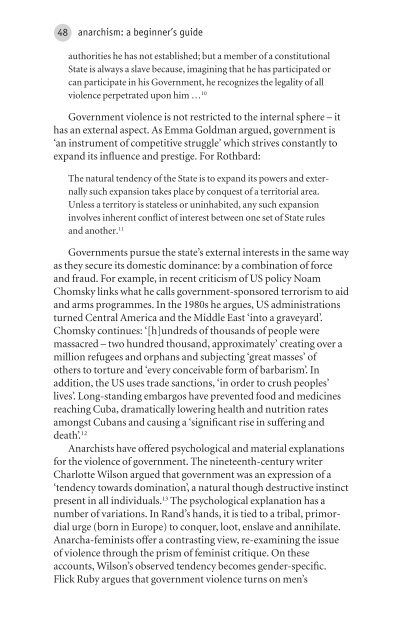o_195qg5dto17o4rbc85q1ge61i84a.pdf
You also want an ePaper? Increase the reach of your titles
YUMPU automatically turns print PDFs into web optimized ePapers that Google loves.
48<br />
anarchism: a beginner’s guide<br />
authorities he has not established; but a member of a constitutional<br />
State is always a slave because, imagining that he has participated or<br />
can participate in his Government, he recognizes the legality of all<br />
violence perpetrated upon him … 10<br />
Government violence is not restricted to the internal sphere – it<br />
has an external aspect. As Emma Goldman argued, government is<br />
‘an instrument of competitive struggle’ which strives constantly to<br />
expand its influence and prestige. For Rothbard:<br />
The natural tendency of the State is to expand its powers and externally<br />
such expansion takes place by conquest of a territorial area.<br />
Unless a territory is stateless or uninhabited, any such expansion<br />
involves inherent conflict of interest between one set of State rules<br />
and another. 11<br />
Governments pursue the state’s external interests in the same way<br />
as they secure its domestic dominance: by a combination of force<br />
and fraud. For example, in recent criticism of US policy Noam<br />
Chomsky links what he calls government-sponsored terrorism to aid<br />
and arms programmes. In the 1980s he argues, US administrations<br />
turned Central America and the Middle East ‘into a graveyard’.<br />
Chomsky continues: ‘[h]undreds of thousands of people were<br />
massacred – two hundred thousand, approximately’ creating over a<br />
million refugees and orphans and subjecting ‘great masses’ of<br />
others to torture and ‘every conceivable form of barbarism’. In<br />
addition, the US uses trade sanctions, ‘in order to crush peoples’<br />
lives’. Long-standing embargos have prevented food and medicines<br />
reaching Cuba, dramatically lowering health and nutrition rates<br />
amongst Cubans and causing a ‘significant rise in suffering and<br />
death’. 12<br />
Anarchists have offered psychological and material explanations<br />
for the violence of government. The nineteenth-century writer<br />
Charlotte Wilson argued that government was an expression of a<br />
‘tendency towards domination’, a natural though destructive instinct<br />
present in all individuals. 13 The psychological explanation has a<br />
number of variations. In Rand’s hands, it is tied to a tribal, primordial<br />
urge (born in Europe) to conquer, loot, enslave and annihilate.<br />
Anarcha-feminists offer a contrasting view, re-examining the issue<br />
of violence through the prism of feminist critique. On these<br />
accounts, Wilson’s observed tendency becomes gender-specific.<br />
Flick Ruby argues that government violence turns on men’s




